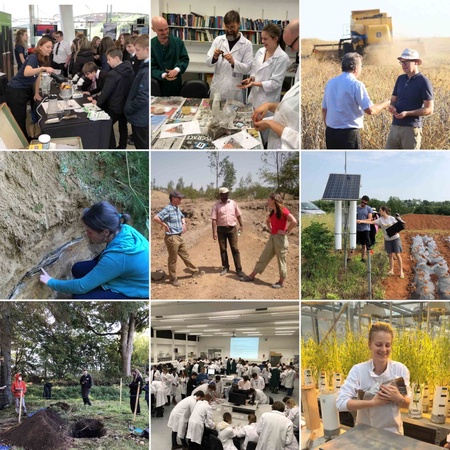World-leading University of Aberdeen research and teaching in soil science promoting the control of greenhouse gas emissions and sustainable food production has been recognised with the institution being awarded a prestigious Queen's Anniversary Prize - the highest national Honour awarded in UK further and higher education.
Prizes are granted by Her Majesty The Queen every two years and recognise outstanding work by UK universities and colleges that shows quality and innovation and delivers real benefit to the wider world and public.
The University has an internationally renowned centre of excellence in Soil Science striving for solutions to some of society’s greatest threats – the climate crisis and environmental change.
Aberdeen scientists have led the way in the collection, interpretation and publication of data related to the climate crisis, loss of biodiversity, degradation of soils, global pollution and food security. University researchers have been pivotal in helping place these on the global agenda.
Professor George Boyne, Principal and Vice-Chancellor of the University of Aberdeen, said:
“It’s a tremendous honour to achieve a coveted Queen’s Anniversary Prize which is a true endorsement of University of Aberdeen research making a real-world difference in two of humanity’s greatest challenges – climate change and the deterioration of our global soil resource. Understanding soils at all scales enables us to respond to the climate crisis, address food security and rebuild our loss of biodiversity.”
Professor Marion Campbell, Vice-Principal for Research, said:
“The award of a Queen’s Anniversary Prize is testament to the outstanding research being undertaken by our soil scientists at the University of Aberdeen. Delivering excellent research with impact is at the heart of our mission and I am delighted our work is being recognised in this way”
Professor Graeme Paton, Head of the School of Biological Sciences, and a Soil Scientist, was representing the University at a special Queen’s Anniversary Prize ceremony at St James’ Palace in London tonight (25 November). He added:
“Since the 1950s excellence in soil science has been synonymous with Aberdeen: in research, in education, in outreach, in technology transfer and in commercialisation. Like many colleagues and students, I came to Aberdeen because of its international reputation in soil science.
"This award is a tribute to our outstanding achievements of the past and for our current world class performance. This also reflects our foundations and ambitions for the future. The issues we face in maintaining sustainable soils are greater now than ever before and at Aberdeen we have the techniques, skills and team to face these challenges”
Examples of related University research and its impact include:
- The development of a free to use greenhouse gas calculator - the Cool Farm Tool - now used by governments, NGOs and industry giants to establish and audit their carbon footprint
- The creation of a carbon calculator model for windfarms, now hosted by the Scottish Environmental Protection Agency, to assess environmental impacts of wind turbines on vulnerable landscapes. This has also underpinned new policy to prevent exploitation of upland peatscapes
- The growth of a pioneering rice crop capable of resisting both drought and disease and helping South Asian farmers balance the environmental impact of paddy fields with food security
- Analysis and modelling greenhouse gases and ecosystems to better inform climate change predictions
- Balancing social justice and poverty in Ethiopia with soil restoration measures
- Reducing agricultural losses of nitrogen and maintaining crop productivity
- Investigating how plants and microorganisms can help rebuild deteriorated soil
- Identifying links between rice production and arsenic in the human diet. This and subsequent research in Bangladesh and West Bengal led to the European Food Standards Authority reviewing arsenic in food and implementing guidance on food policy
- Developing microbial biosensors to assess the risks of contaminated land and have been commercially applied worldwide
- Contributing to a network of Critical Zone Observatories across China to explore environmental process from the canopy of forests to the bottom of groundwater aquifers, which is helping guide fertilizer use
- Some of our scientists sit on key climate change panels and contributed to COP26
- Environment and Biodiversity is a key interdisciplinary theme in the University’s 2040 strategy
- The University maintains a high international student demand for postgraduate study in Soil Science
- Graduates are present on government science boards, research panels and international committees
- More than 30% of UK leaders in soil science are estimated to have graduated from the University


